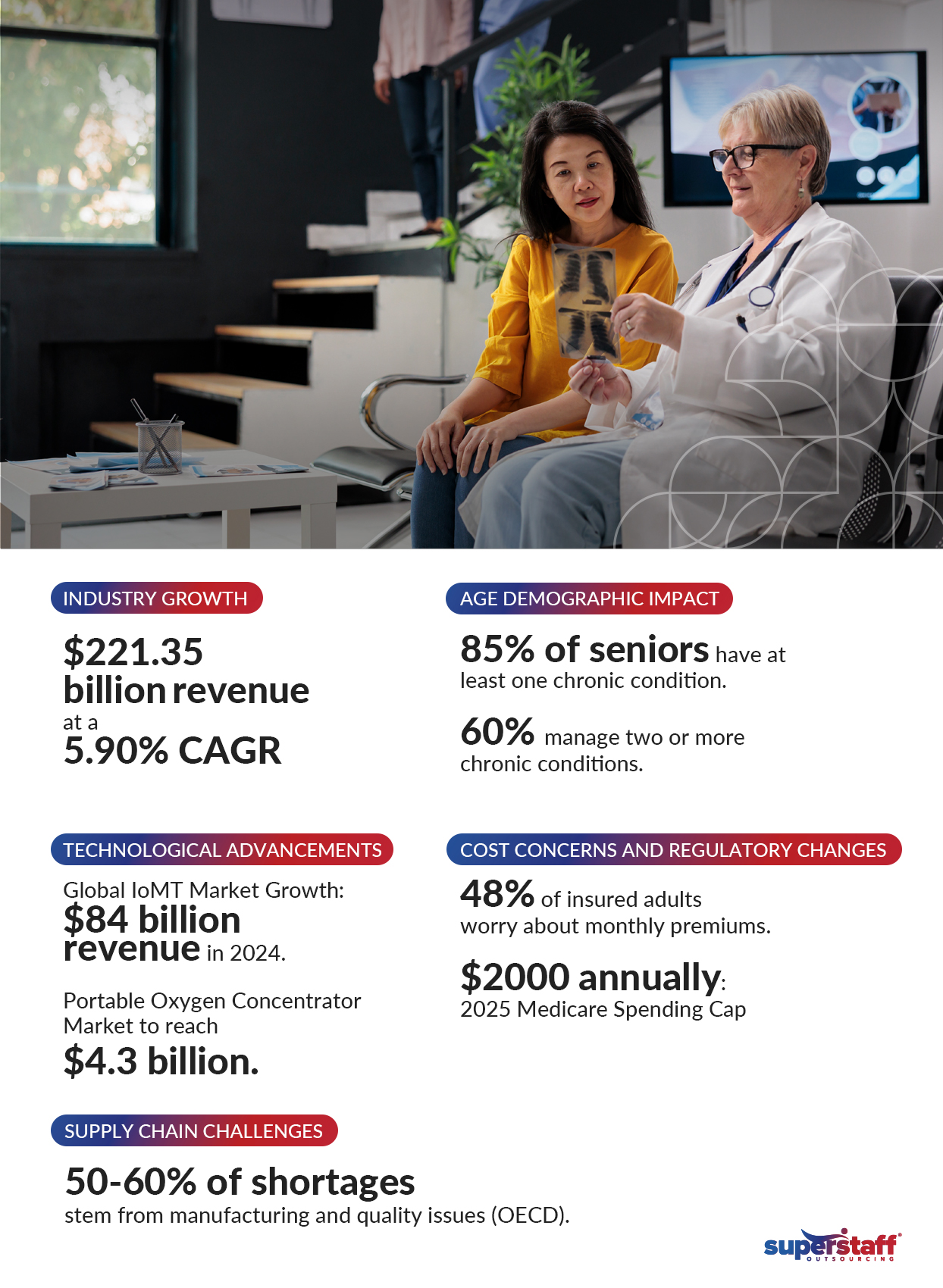
The durable medical equipment industry is undergoing significant transformation. Rapid technological advancements and shifting consumer demands are driving this change, forcing businesses to adapt to a dynamic and increasingly competitive market.
What’s fueling these changes? The growing preference for home healthcare solutions and evolving regulatory requirements are at the forefront. As these trends reshape the industry landscape, DME resellers must find ways to stay agile and uncover opportunities without compromising service quality or incurring substantial costs.
One proven strategy is outsourcing. Partnering with BPO providers allows DME resellers to tackle operational challenges, streamline processes, and maintain scalability while focusing on core business goals.
This blog explores the latest durable medical equipment industry trends and how outsourcing can empower leaders like you to remain competitive and thrive in 2025. Discover actionable insights to help your organization navigate and succeed in this rapidly evolving industry.

Impact of Technological Advancements
Technological advancements are transforming the durable medical equipment (DME) industry, ushering in a new era of innovation. From AI-driven real-time monitoring to IoT-enhanced devices, these tools are revolutionizing how medical solutions are delivered, making them more efficient, productive, and patient-focused.
The Internet of Medical Things (IoMT) is at the heart of this transformation. This groundbreaking technology enables real-time tracking and transparency, allowing patients to access healthcare services, monitor their health, and manage prescriptions from their homes. IoMT is redefining patient care with unprecedented convenience and quality by leveraging the Internet’s vast capabilities.
The numbers tell the story. According to Statista, the global IoMT market is projected to surge from $84 billion in 2024 to an estimated $134 billion by 2029. This explosive growth underscores the immense value and potential of IoMT to shape the future of the DME industry, offering a clear roadmap for innovation and improvement.
Technological advancements are only the beginning. As we delve deeper into durable medical equipment industry trends, the rise of home healthcare emerges as the next pivotal shift reshaping the industry.
The Rise of Home Healthcare
Home healthcare is reshaping the durable medical equipment industry, driven by the demand for convenience and cost-effective solutions. Delivering medical services and equipment directly to patients’ homes offers unparalleled comfort, reduces hospital visits, and significantly lowers healthcare costs—benefits that resonate with both patients and providers.
One of the most compelling aspects of home healthcare is its potential for cost savings. A study by KFF highlights that unexpected medical expenses remain a top financial concern, with 48% of insured adults worried about affording monthly premiums. This economic strain underscores the growing demand for alternatives like home healthcare, which can reduce costs associated with hospital visits and overhead fees while maintaining quality care.
The rise of portable DME further supports this trend. For example, the global portable oxygen concentrator market will reach $4.3 billion within the next decade, reflecting increasing demand for home-based solutions. This growth signals that tools enabling home healthcare are not only here to stay but are also becoming integral to modern patient care.
As home healthcare continues to thrive, it is transforming the DME industry. Alongside this trend, the aging population is driving additional shifts, further shaping the future of durable medical equipment.
Meeting the Needs of an Aging Population
Senior citizens across the globe are also significantly driving the demand for durable medical equipment (DME). With unique medical needs and a higher risk of chronic illnesses, this demographic requires specialized healthcare solutions to maintain quality of life and address mobility challenges. These factors are making DME increasingly vital in meeting the medical needs of the elderly.
The scale of this need becomes even more evident through data. According to the National Library of Medicine, chronic diseases are among the most prevalent and costly health issues in the U.S. Approximately 85% of adults aged 65 and older have at least one chronic condition, while 60% are managing two or more. This underscores the importance of tailored DME offerings, from products addressing specific health conditions to customizable solutions that deliver exceptional care and an enhanced patient experience.
As the DME industry evolves to meet these demographic demands, regulatory changes are another key factor shaping its future. Let’s delve into how these shifts impact the industry and what it means for providers and resellers.
Navigating Regulatory Changes and Reimbursement Policies
As the durable medical equipment industry navigates the intersection of technological advancements and demographic demands, evolving medical regulations and reimbursement policies add another layer of complexity. These changes will significantly influence resellers’ operations, requiring careful adaptation to maintain compliance and ensure secure, seamless transactions.
One of the most notable shifts in 2025 is the introduction of a $2,000 spending cap on medicine and drugs under Medicare. This policy aims to curb overspending among patients and insurance members, providing financial relief while promoting more controlled healthcare expenditures. Additionally, a new option for distributing insurance payments through monthly installments will ease financial pressures on patients, making healthcare more accessible. Another focus area is mental health, with updated policies emphasizing improved support for mental health-related conditions.
Staying ahead of these regulatory updates is crucial for resellers to remain compliant and competitive. Yet, beyond policy adjustments, the DME industry must address logistical challenges impacting operations. Let’s delve deeper into how these challenges shape the landscape and what resellers can do to overcome them.
Addressing Supply Chain Vulnerabilities
Following the COVID-19 pandemic, medical supply chain vulnerabilities have become a pressing issue for DME resellers. The disruption revealed sourcing and inventory management weaknesses, prompting resellers to prioritize strengthening their supply chains for future preparedness.
However, studies by the OECD show that these challenges existed long before the pandemic. Historically, manufacturing and quality concerns have accounted for 50-60% of medical supply shortages. While the pandemic intensified these issues, it also underscored the critical need for long-term solutions to prevent recurring disruptions.
DME resellers can address these vulnerabilities by building robust partnerships with multiple medical suppliers to diversify sourcing and maintain consistent inventory levels. Additionally, outsourcing supply chain management to experts ensures precise forecasting, efficient inventory handling, and timely replenishment, helping resellers stay ahead of demand.
As resellers navigate supply chain challenges, they must also contend with fast-paced competition and the growing influence of large markets, further shaping the future of the DME industry.
Facing Competition and Consolidation in DME
The DME industry is evolving under increased competition, rapid demands, and rising expectations. This competitive environment, coupled with market consolidation, is reshaping the industry landscape, making it essential for businesses to adapt quickly.
To understand the scale of the opportunity, consider this: according to Grand View Research, the global DME market generated $221.35 billion in revenue in 2023 and is projected to grow at a robust CAGR of 5.90% through 2030. With such vast market potential, expanding market share becomes a key priority. Targeting smaller, niche markets can be a strategic move, enabling resellers to penetrate broader segments, boost sales, and strengthen brand presence.
Meeting these demands requires more than traditional strategies. Outsourcing to BPO providers offers a solution by streamlining operations, enhancing scalability, and enabling DME resellers to focus on growth, innovation, and staying competitive in this dynamic industry.
Enhancing Customer Support Through Outsourcing

In the medical field, timely and accurate responses to customer inquiries are essential. Patients rely on you for critical information about healthcare supplies and prescriptions, making addressing concerns promptly and precisely vital. With specialty healthcare outsourcing, you can leverage a dedicated team of professionals to manage these responsibilities efficiently, allowing you to concentrate on your core operations as a DME reseller.
BPO providers offer 24/7 customer support tailored to the specific needs of the DME industry. This round-the-clock service ensures that your business remains accessible across all time zones, delivering seamless assistance to a diverse, global customer base. Multilingual capabilities further enhance support by breaking down language barriers and fostering trust with patients and clients from various backgrounds.
Beyond customer support, BPO providers bring additional value by streamlining back-office functions, ensuring your DME operations run smoothly and effectively.
Streamlining Back-Office Operations
In addition to customer support, BPO providers offer invaluable assistance with back-office operations for the DME industry. Tasks such as order processing, billing, and inventory management demand precision, consistency, and time—resources that are often stretched thin for in-house teams.
Managing these essential processes internally can become overwhelming, leading to errors or delays. BPO providers with years of expertise ensure these tasks are handled accurately and efficiently. From error-free invoicing to seamless order entries, they help reduce billing issues and streamline patient transactions. Advanced technologies utilized by BPOs also enable real-time inventory monitoring and proactive restocking alerts, ensuring you’re always prepared to meet demand.
The fast-paced nature of the DME industry requires flawless execution. Patients depend on timely transactions and stocked supplies for their critical health needs. By outsourcing back-office operations, you can ensure smooth processes, enhance patient experiences, and focus on delivering superior care.
Simplifying Claims and Reimbursements
With the upcoming 2025 Medicare changes, including new policies and reimbursement structures, staying compliant is critical. BPO providers remain updated on these regulatory shifts, ensuring your practices align with the latest requirements. As healthcare reimbursements evolve, outsourcing this function guarantees adherence to updates while maintaining operational efficiency.
BPO providers bring efficiency and precision to your insurance claiming and reimbursement processes, ensuring they are error-free, seamless, and fast. Their expertise in documentation and follow-ups fosters transparent communication between your DME business and insurance members, significantly reducing claim delays while minimizing the risks of denials or false claims.
Managing insurance claims in-house can overwhelm your team, affecting productivity and claim accuracy. BPO providers alleviate this burden by leveraging specialized teams to handle high claim volumes, allowing your staff to focus on core responsibilities.
Outsourcing medical reimbursements offers a cost-effective strategy, especially in an uncertain economic landscape. By streamlining these operations, you can maintain financial stability while ensuring patients and insurance members receive timely, accurate service.
Cost Savings and Scalability Through BPOs
Building an in-house team often comes with significant financial overhead. Outsourcing to a BPO provider eliminates this burden by giving you access to a team of specialists who can handle your non-core DME tasks with expertise and efficiency. The true advantage of outsourcing lies in its cost-saving potential and operational scalability.
Seasonal spikes are a common challenge in the durable medical equipment industry. During peak seasons, an understaffed team can lead to delays and compromised service quality, while overstaffing results in unnecessary expenses. BPO providers address this issue by offering scalable solutions, allowing you to adjust manpower based on demand. This flexibility ensures that your operations remain efficient and cost-effective, regardless of seasonal fluctuations.
By leveraging outsourcing for operational efficiencies and scalable strategies, you can shift your focus to core DME competencies without sacrificing the quality or reliability of your operations. This approach positions your business to meet industry demands and maintain exceptional service standards year-round.
Keep Pace With Durable Medical Equipment Industry Demands This 2025
The durable medical equipment industry outlook offers a mix of challenges and exciting opportunities. Advanced technologies, shifting demographics, and evolving regulations drive significant changes, requiring DME resellers to adapt and innovate to stay competitive.
Outsourcing has proven to be a strategic solution for addressing these shifts. It enables resellers to streamline customer support, manage back-office tasks more efficiently, reduce costs, and scale operations to meet seasonal or growing demands.
As the new year approaches, outsourcing with SuperStaff can help you stay ahead. With scalable solutions, 24/7 multilingual customer support, and industry expertise, SuperStaff is ready to enhance your operations and position your business for success in the durable medical equipment industry.






